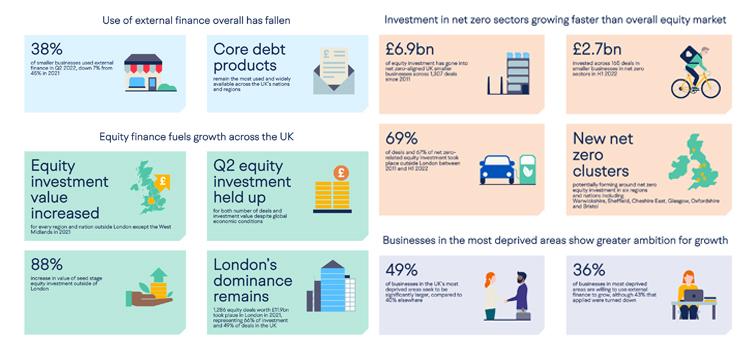Report and publications
Our Nations and Regions Tracker 2022 Report (.pdf - 9.86 MB) provides analysis that illuminates the geographic patterns seen in UK small business finance. This is the Bank’s second annual Nations and Regions Tracker, designed to complement our flagship Small Business Finance Markets report with additional regional analysis.
There are three main sections to this year’s report. Section 1 begins with an overview of finance markets in the regions and nations of the UK, utilising industry data and our own management information to give as complete a picture as possible. The overview explains which forms of finance are most used across the UK and delves into some of the geographic imbalances and recent trends in usage we see. The next two sections provide in-depth analysis on two important topics facing the UK and for which the Bank has a role to play. The first is an exploration of the challenges faced in accessing finance in ‘deprived areas’ and looks at what may be driving the different outcomes. The second looks at how individual nations and regions are beginning their net zero journeys from different starting points, the impact this could have on levelling up, and the role investment in innovation has to play. The final section of the report sets out some of the key datapoints for each nation and region in the UK needed to understand finance markets in that location.

Key findings:
- Use of external finance overall has fallen, with 38% of smaller businesses using external finance in the four quarters to Q2 2022, down 7% from 45% in 2021. Core debt products remain the most used and widely available across the UK’s nations and regions.
- Equity finance fuels growth across the UK with the equity investment value increasing for every nation and region outside London except the West Midlands in 2021. Equity investment also held up in Q2 2022 for both the number of deals and investment value, despite global economic conditions, although there are early indications of a slowdown in the second half of the year. While London’s dominance remains with 1,286 equity deals worth £11.9bn, seed stage equity investment outside of London increased 88% in value whilst it reduced by 22% in the capital.
- Businesses in the most deprived areas show greater ambition for growth. 49% of businesses in the UK’s most deprived areas seek to be significantly larger, compared to 40% elsewhere and 36% of businesses in most deprived areas are willing to use external finance to grow, although 16% that applied between 2019 and 2021 were turned down between compared to 11% elsewhere.
- Investment in net zero sectors is growing faster than the overall equity market. £6.9bn of equity investment has gone into net zero-aligned UK smaller businesses across 1,307 deals since 2011 and £2.7bn has been invested across 165 deals in H1 2022. 69% of deals and 67% of net zero-related equity investment between 2011 and H1 2022 took place outside of London, with new net zero clusters potentially forming in six nations and regions across the UK.
- The British Business Bank is improving access-to-finance conditions for businesses in the UK’s most deprived areas. The British Business Bank’s regional funds have invested £540m since launch and its six new Nations and Regions Investment Funds have committed £1.6bn to early stage finance.
Nations and Regions Tracker: Small Business Finance Markets 2022
Our Nations and Regions Tracker 2022 Report provides analysis that illuminates the geographic patterns seen in UK small business finance.